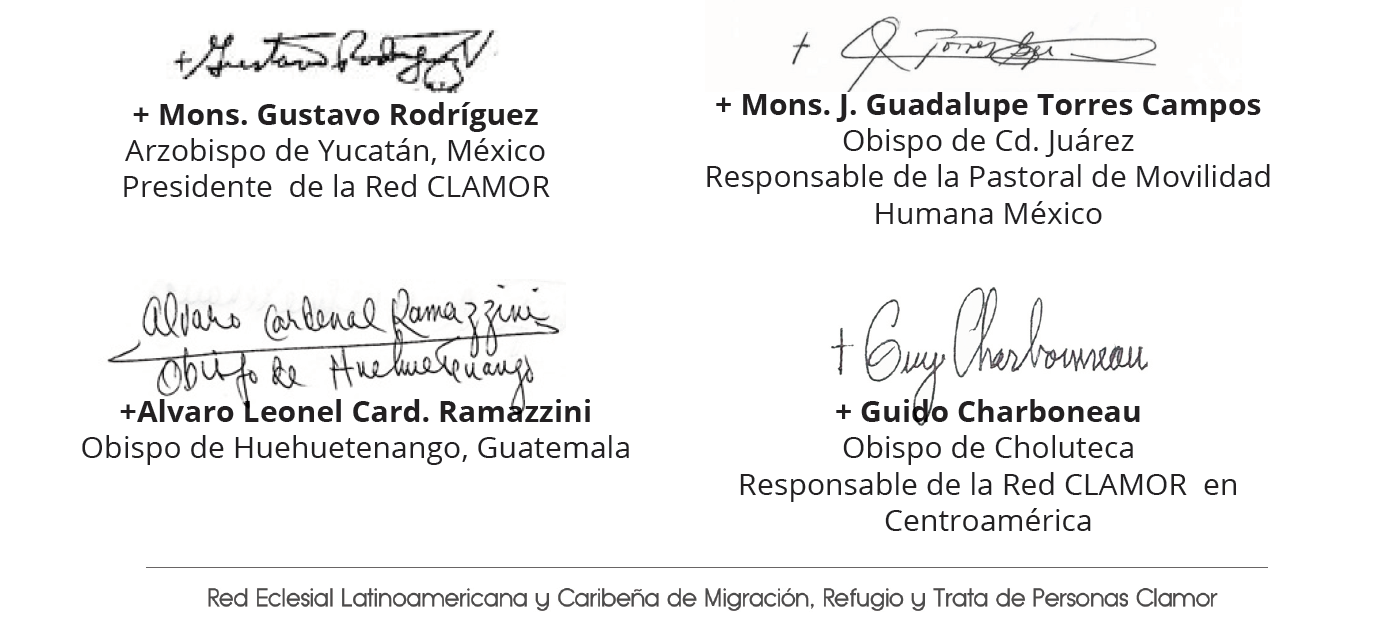
Mexico City, September 8, 2021
Lic. Andrés Manuel López Obrador
Constitutional President of the United Mexican States
Lic. Marcelo Ebrard Casaubón
Secretary of Foreign Relations
Lic. Alejandro Encinas Rodríguez
Undersecretary of Human Rights, Population and Religious Affairs
We, the Latin American Church Network and Caribbean Migration, Refuge, Displacement and Trafficking (CLAMOR) of the Latin American Episcopal Council, which brings together more than 600 organizations of the Catholic Church in Latin America and the Caribbean, have seen in recent days the development of the National Institute of Migration and of the National Guard in the south of the Mexican Republic´s operations to contain migrants in the city of Tapachula, Chiapas.
We are aware of a deep migration crisis on Mexico´s southern border where hundreds of people from countries in the north of Central America, Cuba, Venezuela, and now a considerable number from Haiti, await a favorable resolution to their requests for refugee status, complementary protection, or access to immigration regularization.
Overcrowding, the lack of hygiene measures, food, basic supplies, coupled with the slowness in the resolutions of the National Institute of Migration (INM) and the Mexican Commission for Aid to Refugees (COMAR) place people in a vulnerable situation, affecting the exercise of their responsibilities and fundamental rights.
The shelters, migrant houses and soup kitchens for migrants are saturated and at the limit of their capacity, and the efforts of local churches, parishes, dioceses are being exceeded due to the lack of a migration policy in accordance with human rights standards, of a planning strategy, and with little or no resources of the Federal Government.
We strongly regret and reject the repressive, violent and containment of migration on the southern border, particularly in Tapachula. These measures have been implemented on previous occasions with a negative balance in their results. Therefore, we call for alternative solutions that go beyond the short-term vision, prioritizing dialogue with migrants and civil society organizations in such a way that responses can be articulated according to the needs and in guarantee of rights. humans.
We have seen in the recent events at the southern border (the containment of migrants and summary deportations) measures promoted by the United States that are related to the policy of outsourcing the border. The political decisions of both governments affect both the local population and migrants, who are left in a dead end. We are concerned that the only option for regularization of the migratory stay in Mexico is the refugee application. And that free transit through the national territory is prevented from those who already have a favorable resolution of their legal stay in Mexico.
For all of the above, we urge the competent authorities, mainly the Ministry of Foreign Affairs, the National Institute of Migration and the Mexican Commission for Aid to Refugees, to carry out concrete actions to assist people in the context of mobility, respecting due process, and thereby avoiding and preventing human rights violations.
Finally, we demand that the authorities at all levels respect article 11 of the Magna Carta that establishes free transit, so that those who already have a legal stay in Mexico are allowed to transit through the country in search of options for residence and employment that allows them to live with dignity and access basic services.
We urge the Mexican government, true to its history as a place of origin of so many migrants, to show clear signs of hospitality and welcome, and based on the powers that the laws confer on it, to establish new alternatives for regularization in accordance with that which allow the migrant population to access to the human rights that assist them for their very dignity as persons, and in this way contribute their wealth to the host communities.
This crisis is also an opportunity for the Mexican government to demonstrate regional leadership by responding to the migration challenge from the respect and guarantee of rights. Enough of repression, the use of violence and the excessive abuse of authority, it is not only about migrants, but about human beings who need an opportunity to live with dignity.
We invite the government of Mexico to focus on addressing the root causes that make thousands live out the drama of displacement and the need to seek safety in another territory and the necessary conditions to live, which they cannot find in their country.
As the Church of Latin America and the Caribbean, we feel deeply committed to the reception, protection, promotion and integration of migrants and we reiterate our commitment to the defense and protection of their human rights at the same time that we are ready to collaborate with the authorities in order to find coordinated humanitarian aid mechanisms in the solution of this deep crisis that is experienced in the southern border of México.


